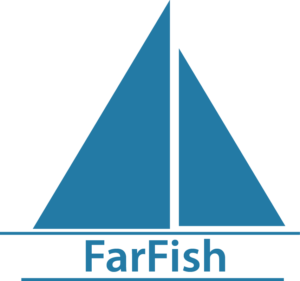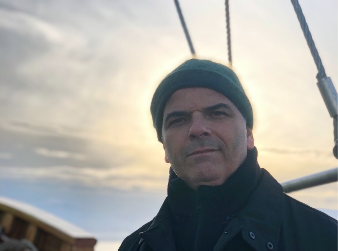FarFish – Inspiration for Changes
Cadu Villaça from Brazil participated in the Far Fish Marine Management and Innovation course at the University of Tromsø this past March. He wrote to us last week to let us know of some exciting developments in his professional life, part of which he attributes to his participation in the FarFish course. This highlights how the FarFish project is having impact in the partner countries and the live of those connected to the project. An abridged version of his letter follows:
My participation in the course in Marine Management and Innovation promoted by the FarFish Project at the University of Tromsø, and the opportunity it provided to spend a few days with excellent teachers and young talents in the incredible environment of the University and the beautiful Tromsø, and experiencing the boat ride with Hermes II after such a high conversation with the entrepreneur and owner, among so many other experiences and conversations, recently helped me make professional and personal decision of great importance.
For a long time, I have dedicated part of my time to representing the Brazilian Fishing Sector. This started with the intention of including the lobster fishery of the state of Ceará in a Fishery Improvement Project (FIP). After some time, I was appointed to assume the Technical Direction of Conepe, the National Collective of Fishing and Aquaculture.
There, with a national perspective, I was exposed to a much more complex system involving many environments, fisheries and cultures. I experienced and became aware of the difficulties and shortcomings of National Fishing Management.
Some ICCAT meetings we have been able to attend have served as a good example of what can be achieved through international cooperation for sustainable fisheries. It is clear that when protocols of data collection and consolidation are established, and when properly analyzed and when reflected in standards and deliberations discussed in a respectful environment, even geographic and cultural barriers can be overcome to develop management systems on the basis of the best available information, prevailing coherence.
The course in Tromsø addressed many legal aspects of international management. The FarFish project also deals with this, namely the participation of European fleets in fisheries in international areas, whether by bilateral treaties or by activity in international waters, and the commitment of these fleets and their actors to promote in these regions action aimed at sustainability and efficient management of natural resources.
These experiences and the background I have gained over the years, have moved me decide to accept an invitation from the National Secretary of Aquaculture and Fisheries to join the Board of Directors in the Department of Registration and Monitoring.
Within the structure of the Ministry of Agriculture, which attends to agricultural and broodstock activities. The Ministry now comprises our comparatively small Secretary of Fisheries, which returned to this structure after experiences in many other institutions within the federal administration. It basically has three Departments, including Fisheries Development and Management, Aquaculture Development and Management, and of Registration and Monitoring, where I now work.
In accepting this function, I acknowledge that it will not be possible to develop either fishing or aquaculture if we do not get the control of data and information. Our country is lacking in records and consequently cannot monitor activities properly. What is produced, how much and where, with what seasonality, and a lot of other basic information is lacking, which causes problems for development of consistent instruments for management.
Our innovative idea is to promote, through support of technology and automation, a major campaign of systematization and data collection. This will allow us to offer the development departments of Aquaculture and Fisheries, new platforms of data collection and monitoring. It is clear that the Fisheries Department needs a thorough reviews, fleets, value chains, training, and production limits to truly be able to develop a solid and sustainable future scenario. We aim to develop strong cooperation with research centers, civil society representation, legislative powers, to finally bring regulation and legal security that promote medium and long-term investments and enable development and balance in the fisheries sector.
Finally, I must thank the FarFish project and the whole FarFish team for making my participation possible, as well as the UiT staff and the beautiful Tromsø. I hope that the inspiration of this course will reflect a great change in the Brazilian approach to fisheries and aquaculture management, and that we will enter a cycle of development of the Sea Economy in harmony with the various activities, countries and cultures that divide the Oceans.
Cadu Villaça




